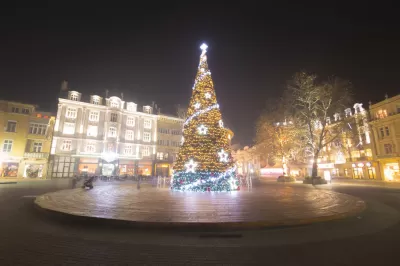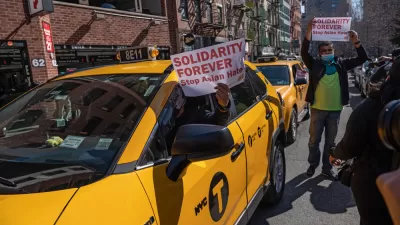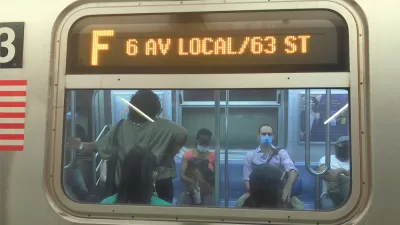As the holiday season approaches and the pandemic continues, cities face an uncertain future.

As the holiday season approaches and the pandemic continues, cities face an uncertain future. While the time of year is typically a high point for travel and sales, COVID-19 casts a shadow of doubt over assumptions about normal trends. Amid an already challenging year, cities may not see the holiday economic boost that they're accustomed to.
Early in the year, some remained optimistic about declining COVID-19 rates by the holiday season. However, with recent daily cases hitting an all-time high, it's clear that won't be the case. This alarming rise in infection rates may affect holiday travel and sales.
Travel Will Reach a High for 2020
Travel, both international and domestic, has remained understandably low this year thanks to the pandemic. As has been the case historically, though, travel will likely increase during the 2020 holiday season. According to Hopper’s Holiday Confidence Report, 39% of surveyed people said they would travel during the holidays.
Of those traveling, 55% said it would be their first time doing so since the onset of the pandemic. So, while overall holiday travel will decrease, it will still represent a high point for much of the year. Cities won’t see the influx of travelers they typically would, but they’ll still receive plenty of visitors.
This bump in travel will bring some needed revenue to cities that have struggled amid the pandemic. While it may not be the stimulus some expected, it is an increase in spending compared to the rest of the year. If local businesses had banked on a typical rise, though, they might be disappointed.
Overall Travel-Related Revenues May Fall
While the holidays will bring an increase in travel, that won't necessarily translate to a similar rise in revenue. On one hand, more visitors means more spending. But falling prices may counteract those profits. The small bump in sales may not be enough to make up for lowered prices.
Prices on airfare for both Thanksgiving and Christmas are down more than 30% compared to 2019. Hotel rates for Thanksgiving weekend have dropped by around 10%, though they expect a small increase nearer Christmas. If COVID-19 cases keep rising, though, it could drive demand and prices even lower.
Local spending may decrease too, given heightened COVID-19 concerns. Customers this year have shifted heavily towards online shopping and may continue that trend into the holiday season. If that's the case, new visitors won’t contribute as much to the local economy as in past years.
Hot Holiday Destinations May Change
Holiday travel trends aren't just changing in number. The reasons people are traveling and the destinations they prefer are also shifting. While 60% of surveyed Americans won’t travel to see friends and family this year, 25% will go on vacation.
People want to travel and escape daily life, but most don’t want to risk COVID-19 in doing so. As a result, this holiday season will feature more trips away from populated areas than towards them. Cities with attractions that enable social distancing may benefit from this trend compared to others.
Iconic urban attractions won't entice holiday travelers like in past years. Instead, smaller and more rustic cities or those with campgrounds will see the majority of year-end travel. Warmer destinations may benefit too, as comfortable and socially distanced outdoor activities continue to be popular.
Holiday Shopping Might Not Make Up for the Lack of Travel
Of course, travel isn't the only source of increased income that cities expect during the holidays. Some retailers may hope that the holiday shopping season makes up for the loss of foot traffic. Studies and trends indicate that this may not be the outcome, though.
As mentioned earlier, online shopping has dominated the retail industry this year. These sales have been so high that logistics companies expect "Shipageddon," or mass disruptions from skyrocketing online purchases. Cities with a strong e-commerce presence might fare better than others, as in-person shopping will likely stay low.
On top of this shift, overall holiday gift spending will likely decrease, mainly due to economic hardship. According to a recent poll, 28% of Americans will spend less on gifts this season than they typically do. As the pandemic continues to take a toll on people’s finances, that number could go up.
This drop in spending hinders the chances of holiday shopping revitalizing local economies amid decreased travel. With the pandemic reaching new heights, its economic consequences will likely grow too.
An Uncertain Holiday Season
2020 has been a challenging year for many cities, both in terms of health and finances. While the holiday season may bring a little relief, the resulting bump won’t be enough to sustain local economies. Cities need to expect a comparatively underwhelming holiday season as far as travel and spending go.
As COVID rates continue to climb, it becomes more difficult to predict what the holiday season may look like. Fittingly, an uncertain holiday caps off a year full of uncertainty. As the year’s end approaches, cities should proceed cautiously and not put too much faith in a late economic boom.

Planetizen Federal Action Tracker
A weekly monitor of how Trump’s orders and actions are impacting planners and planning in America.

Chicago’s Ghost Rails
Just beneath the surface of the modern city lie the remnants of its expansive early 20th-century streetcar system.

San Antonio and Austin are Fusing Into one Massive Megaregion
The region spanning the two central Texas cities is growing fast, posing challenges for local infrastructure and water supplies.

Since Zion's Shuttles Went Electric “The Smog is Gone”
Visitors to Zion National Park can enjoy the canyon via the nation’s first fully electric park shuttle system.

Trump Distributing DOT Safety Funds at 1/10 Rate of Biden
Funds for Safe Streets and other transportation safety and equity programs are being held up by administrative reviews and conflicts with the Trump administration’s priorities.

German Cities Subsidize Taxis for Women Amid Wave of Violence
Free or low-cost taxi rides can help women navigate cities more safely, but critics say the programs don't address the root causes of violence against women.
Urban Design for Planners 1: Software Tools
This six-course series explores essential urban design concepts using open source software and equips planners with the tools they need to participate fully in the urban design process.
Planning for Universal Design
Learn the tools for implementing Universal Design in planning regulations.
planning NEXT
Appalachian Highlands Housing Partners
Mpact (founded as Rail~Volution)
City of Camden Redevelopment Agency
City of Astoria
City of Portland
City of Laramie






























